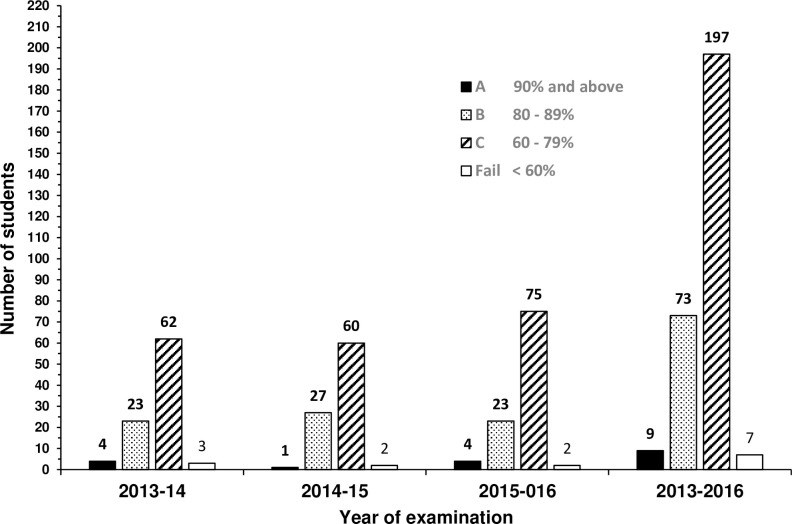Factors predicting students' performance in the final pediatrics OSCE
Affiliations
Affiliations
- Department of Pediatrics, Faculty of Medicine, Health Sciences Center, Kuwait University, Kuwait City, Kuwait.
Abstract
Background: Objective Structured Clinical Examinations (OSCEs) have been used to assess the clinical competence of medical students for decades. Limited data are available on the factors that predict students' performance on the OSCEs. The aim of our study was to evaluate the factors predicting performance on the pediatrics final OSCE, including the timing of students' clerkship and their performance on the in-training OSCE and written examinations.
Methods: Grades in pediatrics for 3 consecutive academic years (2013-2016) were included. The average scores of the in-training OSCEs, written and final OSCEs and written exams were compared among the three years using the analysis of variance (ANOVA) test. The correlations between performance on the final OSCEs and the in-training OSCEs, in-training written exams and final written exams were studied using Spearman's Rho correlation test. The effect of the timing of the clerkship on the final OSCE performance was evaluated.
Results: A total of 286 students' records were included. There were 115 male students and 171 female students (M:F 1:1.5). There were strong positive correlations between students' performance on the in-training examinations (OSCE and written) and the final OSCE (correlation coefficients of 0.508 and 0.473, respectively). The final written exam scores were positively correlated with the final OSCEs (r = 0.448). There was no significant effect of the timing of the clerkship.
Conclusions: Students' performance on in-training examinations might predict their final OSCE scores. Thus, it is important to provide students with the necessary intervention at an early stage to reduce failure rates. The final OSCE performance does not seem to be affected by the timing of the clerkship.
Conflict of interest statement
the authors have declared that no competing interests exist.
Figures
Similar articles
Does student performance on preclinical OSCEs relate to clerkship grades?
Chima M, Dallaghan GB.Med Educ Online. 2016 Jun 22;21:31724. doi: 10.3402/meo.v21.31724. eCollection 2016.PMID: 27340087 Free PMC article.
Dong T, Zahn C, Saguil A, Swygert KA, Yoon M, Servey J, Durning S.Teach Learn Med. 2017 Jul-Sep;29(3):280-285. doi: 10.1080/10401334.2017.1279057. Epub 2017 Mar 2.PMID: 28632015
Use of an objective structured clinical examination in evaluating student performance.
Prislin MD, Fitzpatrick CF, Lie D, Giglio M, Radecki S, Lewis E.Fam Med. 1998 May;30(5):338-44.PMID: 9597531
Changing an existing OSCE to a teaching tool: the making of a teaching OSCE.
Brazeau C, Boyd L, Crosson J.Acad Med. 2002 Sep;77(9):932. doi: 10.1097/00001888-200209000-00036.PMID: 12228103 Review.
The Objective Structured Clinical Examination (OSCE) in the clinical clerkship: an overview.
Tervo RC, Dimitrievich E, Trujillo AL, Whittle K, Redinius P, Wellman L.S D J Med. 1997 May;50(5):153-6.PMID: 9155233 Review.
Cited by
Hultgren C, Lindkvist A, Curbo S, Heverin M.J Educ Eval Health Prof. 2023;20:13. doi: 10.3352/jeehp.2023.20.13. Epub 2023 Apr 6.PMID: 37020414 Free PMC article.
Tsikas SA, Afshar K.BMC Med Educ. 2023 Mar 16;23(1):167. doi: 10.1186/s12909-023-04082-x.PMID: 36927361 Free PMC article.
Lim GHT, Gera RD, Hany Kamel F, Thirupathirajan VAR, Albani S, Chakrabarti R.Adv Med Educ Pract. 2023 Feb 28;14:157-166. doi: 10.2147/AMEP.S381139. eCollection 2023.PMID: 36880093 Free PMC article.
Lawal AO, Abiola AO, Habeebu MYM, Ojewola RW, Tijani KH.J West Afr Coll Surg. 2020 Apr-Jun;10(2):12-16. doi: 10.4103/jwas.jwas_45_21. Epub 2022 Mar 26.PMID: 35558570 Free PMC article.
Ganesananthan S, Li C, Donnir A, Anthony A, Woo T, Zielinska AP, Khajuria A.Adv Med Educ Pract. 2021 Aug 12;12:887-894. doi: 10.2147/AMEP.S325364. eCollection 2021.PMID: 34408530 Free PMC article.
KMEL References
References
-
- Bartfay WJ, Rombough R, Howse E, Leblanc R. Evaluation: The OSCE approach in nursing education. Can Nurse.2004;100:18–23 - PubMed
-
- Kreptul D, Thomas RE. Family Medicine Resident OSCEs: A Systematic Review. Educ Prim Care.2016;13:1–7 - PubMed
-
- Alkhateeb N. E., Al-Dabbagh A., Ibrahim M., & Al-Tawil N. G. (2019). Effect of a Formative Objective Structured Clinical Examination on the Clinical Performance of Undergraduate Medical Students in a Summative Examination: A Randomized Controlled Trial. Indian pediatrics, 56(9), 745–748. - PubMed
-
- Gillette C, Stanton RB, Anderson HG Jr. Student Performance on a Knowledge-Based Exam May Predict Student Ability to communicate Effectively with a Standardized Patient During an Objective Structured Clinical Examination Curr Pharm Teach Learn.2017;9(2):201–207 10.1016/j.cptl.2016.11.004 - DOI - PubMed
-
- Lucélio B. Couto, Marina T. Durand, Amora C. D. Wolff, Carolina B. A. Restini, Milton Faria Jr, et al. (2019) Formative assessment scores in tutorial sessions correlates with OSCE and progress testing scores in a PBL medical curriculum, Medical Education Online, 24:1, 1560862, 10.1080/10872981.2018.1560862 - DOI - PMC - PubMed
